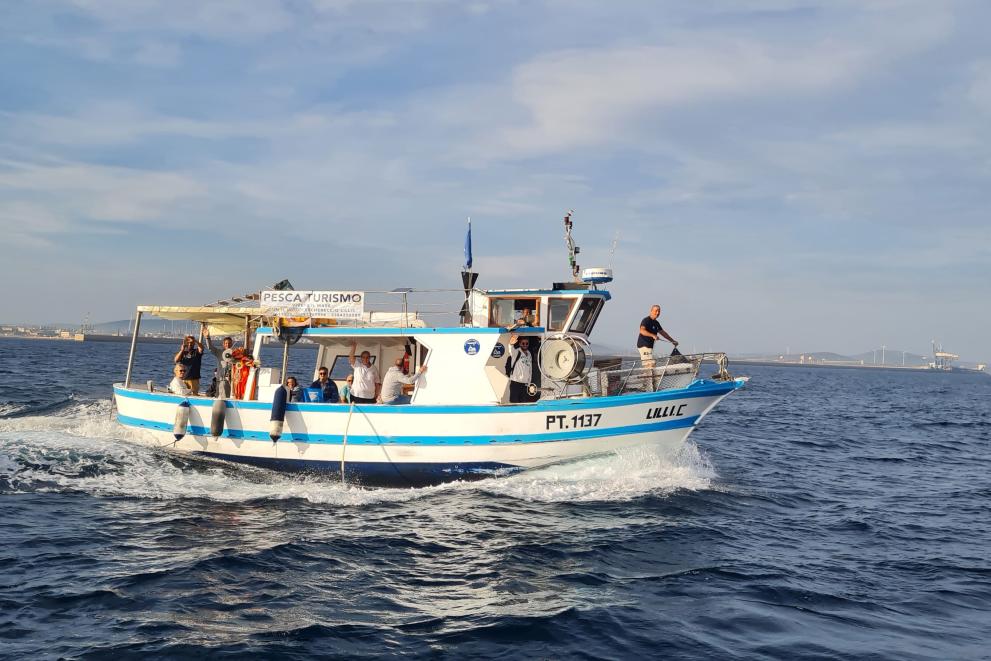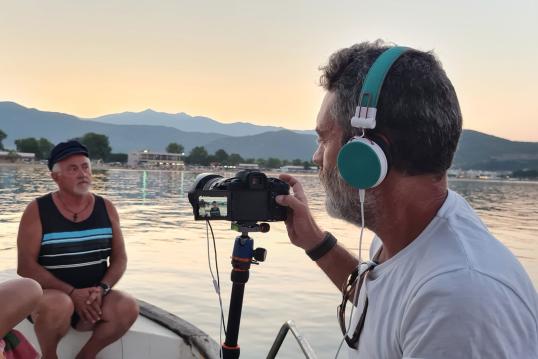
From the shores of Sardinia to the coasts of Greece, fishers are embarking on new adventures to make their trade known to the wider public. With the support of Fisheries Local Action Groups (FLAGs), fishers are being trained, going on study visits, and learning to diversify their income.
Gavino Iacomini, a skipper on the 'Pescaturismo K2' has been fishing since the age of 14. For the last six years he, and other fishers, have been practicing pescatourism to diversify their sources of income.
Silvia Pazola is a pescatourism operator who invested in a boat with her partner in 2016 to start their business within the marine protected area of Asinara. She sees pescatourism as an opportunity to demonstrate their way of life, share the joy of preparing the fresh catch and enjoy a meal together with tourists onboard their boat.
These are just two examples from a group of Sardinian fishers who found balance between artisanal fisheries, sustainability, and tourism, and most importantly a way to diversify their income.
What is pescatourism?
Pescatourism can be described as non-commercial fishing activities that use marine aquatic resources for recreation, tourism, or sport. It is gaining popularity across Europe and is an opportunity for fishers to protect their livelihoods and traditional ways of life by diversifying their income. By engaging in pescatourism fishers also keep their income steady, even in the harder fishing months of July and August.
From Italy to Greece
Greece's fishing industry got a lifeline in 2015 with the introduction of pescatourism regulations. The new rules let fishermen take tourists on their boats, boosting their income and offering an alternative to past practices of scrapping boats, which reduced the fleet and impacted Greece's rich maritime heritage.
However, pescatourism faced a snag - a lack of awareness. Both fishers, unfamiliar with the intricacies of tourism, and tourists, unaware of pescatourism, remained hesitant. To bridge this gap, 18 Fisheries Local Action Groups (FLAGs) joined forces to transform pescatourism into a unique 'slow tourism' experience, with the support of the European, Maritime and Fisheries Fund (EMFF).
Bringing fishers onboard
The FLAGs launched a comprehensive approach to promote pescatourism. They started by building rapport with fishermen through port visits and discussions. Informative sessions and surveys gauged fishermen's knowledge, interest, and obstacles. As interest rose, FLAGs organised training on legalities, finances, and marketing.
To support fishers even further, the FLAGs coordinated with Italian counterparts, organising a study visit to learn from Sardinian fishers experienced in pescatourism. The visit allowed fishers from both countries to connect and discuss how to operate a pescatourism business, along with the challenges and best practices.
The visit allowed the Greek fishers to experience pescatourism and exchange with their Italian counterparts on the diversification process, beyond what had been covered in their training sessions.
Breathing new life into the industry
Increased awareness of pescatourism has breathed new life into the industry. Through this project, over 450 fishers explored pescatourism opportunities, while more than 100 received specific training. In addition, as of September 2023, 48 fishers took steps to obtain pescatourism licenses, while 157 fishers are currently engaged in pescatourism activities.
Lili Lymperopoulou, FLAG Coordinator, said: “Together, we can make change happen in our local communities.”
Fishers can live almost exclusively from pescatourism in July and August, with a single trip bringing in approximately €500 per day.
Pescatourism also reduces pressure on local fish species. For example, during a pescatourism trip, a gillnet fisher sets around 0.5 kilometres of net, compared to around 5 km for a day of professional fishing. The activity also provides opportunities for youth in the sector, preserving vital skills, as well as traditional vessels and the heritage they represent.
More information
Video on the project (long version)
Video on the project (short version)
Facebook page: facebook.com/PescaTourismGreece
Details
- Publication date
- 7 June 2024
- Author
- Directorate-General for Maritime Affairs and Fisheries





